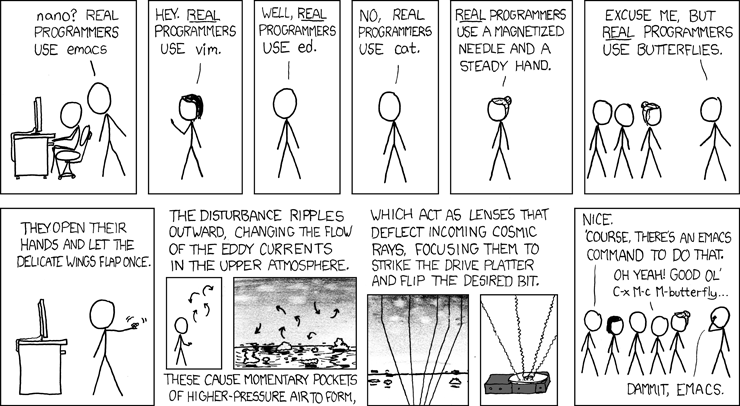Editors#
We already looked at nano to edit files. An editor not only allows us to write our source
code, but it can also help us by:
Doing syntax highlighting of the language
Handle indentation for us
Show mismatched
)and}in our codeAutocompleting variable and function names
and more.
Let’s look at some common editors

Fig. 3 from XKCD#
nano#
nano is a pretty basic editor and very easy to use. We already saw that when we saved our
hello.cpp it recognized it as C++ code and highlighted it in different colors.
There are some basic customizations you can make by creating a ~/.nanorc file,
some of which are listed here: customizing nano
You will be able to complete all of the course work using nano as your editor. However you are encouraged to explore alternatives.
emacs#
Emacs is a powerful editor that has a large number of extensions.
You can run emacs in a terminal (instead of a separate window), by doing:
emacs -nw
This is useful for remote connections.
Some basic commands with emacs:
C-x C-c: exit without savingC-x C-s: save the fileC-g: break out of whatever command you may be in the middle ofC-space: set a mark (starting point) for selecting textC-w: cut the text (into the “kill ring”)C-y: paste the text from the kill ring (y is for yank)
Here C- means use the control key.
Here’s my emacs config file file.
vim/vi#
vi or vim has two modes: command mode where you enter commands like save, delete, cut / paste, etc. and insert mode where you enter text into the editor.
You can open a file for editing by:
vi file.txt
by default you are in command mode.
To get into insert type
iTo return to command mode hit the ESC key
Documentation is available here: https://www.vim.org/docs.php
To save the file and exit you enter command mode and type :wq
VS Code#
VS Code is a graphical editor that is extremely popular today. It has a large number of extensions. One of the most popular extensions is the “remote - ssh” extension that allows you to run VS Code on your local machine and edit files on a remote machine (connecting via SSH).
There are extensive introductory videos here: https://code.visualstudio.com/docs/introvideos/basics